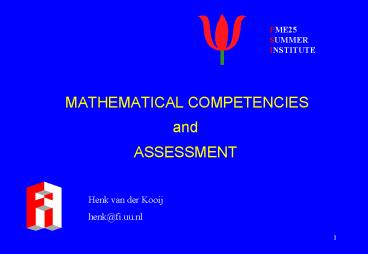MATHEMATICAL COMPETENCIES and ASSESSMENT - PowerPoint PPT Presentation
1 / 16
Title:
MATHEMATICAL COMPETENCIES and ASSESSMENT
Description:
integrates the use of IT (Java applets and GC) in both the learning process and assessment ... (Steen & Forman) 13. Jim Ridgway (GB) ... – PowerPoint PPT presentation
Number of Views:646
Avg rating:3.0/5.0
Title: MATHEMATICAL COMPETENCIES and ASSESSMENT
1
MATHEMATICAL COMPETENCIESand
ASSESSMENT
PME25 SUMMERINSTITUTE
Henk van der Kooij henk_at_fi.uu.nl
2
project (1996 - 2000)Engineering, age 16 - 20
- A new math program for vocational education that
- really supports the vocational subjects
- accepts the algebraic poor students
- integrates the use of IT (Java applets and GC) in
both the learning process and assessment - is based on the theory of Realistic Math Education
3
Dutch school system
4
Important Issues for Engineering
- Reading and interpreting complex graphs
- Relationships between more than two variables
- Proportionality, both direct and inverselyPower
functions, not polynomials! - Variables have Dimensions and Units
5
Lathe v p n d
rotational
speed
(rpm)
n
640
1280
2560
cutting
640
315
speed
(m)
v
160
320
80
160
40
80
20
40
10
20
10
10
20
40
80
160
320
640
(mm)
diameter
d
6
Vocational Education in Europe
- Until recentlyQualifications for the workplace
were described in terms of factual knowledge, on
a very detailed level - New policy (to be introduced soon)Qualification
s for the workplace are described in terms of
(very general) competencies related to core
problems of the profession
7
Broad Occupational Competencies (Advisory Board
for Education and Labour Market)
- Description (in mutual coherence) of product,
process and task in order to be able to carry out
occupational tasks in an efficient - Development of methodical competencies (planning,
problem solving) should be emphasized more than
the concrete way (task, instrument, knowledge,
method) in which problems are attacked at this
very moment
8
Mathematical Literacy vs Numeracy
- Numeracy - the ability to add up (English
political version)- basic skills (percent,
order of operations USA back to
basics-movement in California) - Mathematical Literacy (PISA, OECD, 1999) an
individuals capacity to identify and understand
the role that mathematics plays in the world, to
make well-founded mathematical judgements and to
engage in mathematics, in ways that meet the
needs of that individuals current and future
life as a constructive, concerned and reflective
citizen
9
OECD/PISA Framework for Assessment of
mathematical literacy
Mathematical Competencies (Skills)
- Representation
- Symbolic, formal and technical skill
- Communication
- Aids and tools
- Math thinking and reasoning
- Math argumentation
- Modeling
- Problem posing and solving
10
PISA Competency Classes
- Class 1 Reproduction, definitions,
computations - Class 2 Connections and Integration for
problem solving - Class 3 Mathematical thinking, generalization
and insight
11
PISA Assess Overarching Math Concepts rather
than Math Contents
- Quantity
- Uncertainty
- Change and Relationships
- Space and Shape
12
Bussiness expectations of mathematical
performance(Steen Forman)
- Problem solving that relies on sophisticated
uses of relatively elementary mathematical
tools. More concrete, more common and as
challenging as routine manipulations involving
advanced topics (trigonometric equations and
quadratics) of school math - Mathematical habits
of mind that are embedded in contexts such as
measurement, management and quality control.
In contrast to the easily recognizable math
skills of arithmetic, geometry and algebra,
these distinctively mathematical patterns of
thought underlie many aspects of the
occupational skills standards but are rarely
identified as mathematical skills
13
Jim Ridgway (GB)
- Successful application of math technique is
essential in engineering (but how and with what?
IT tools?!) - competencies learned from a broad based education
generalise to practical work aquisition of
mathe-matical techniques does not. - mathematical technique is not a 'foundation' but
rather is a component of math education - mathematics education should encourage the
development of a broad range of skills, and some
successful application of technique - the perfecting of math technique should not be
pursued for its own sake
14
Changes in teaching / learning stylesfrom
learning to learning- structures - to
structure- formulas - to formulate- to
imitate - to create- to use the method -
to develop and use of the teacher to do own
strategies to exercises solve
problems - being a consumer - being a
producer of knowledge
15
Mathematical Competenciesfor the Workplace (and
daily life)
- Flexible use of mathematical methods
- Problem Solving and - Posing attitude
- Structuring and Organizing activities
- Confidence in handling information (data)
- Appropriate use of ICT - tools
16
Recommendations
- Broad Occupational Competencies include
mathematical competencies, but hardly any
traditional ones (focus on concepts and less on
algorithms, techniques)Methodical Competencies - Appropriate use of IT tools is needed for work
and daily life (IT Competencies) - Mathematics education should have its starting
point in these competencies instead of in formal
mathematics - Assessment should reflect these changes

